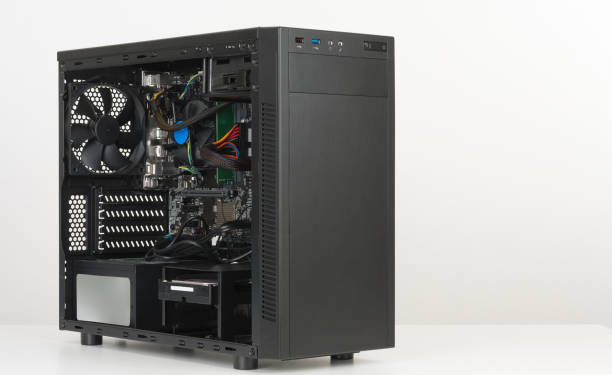Industrial ventilation systems rely heavily on impeller fans to facilitate greater volumes of air flow, improve on the quality of air and regulate temperature within large premises. These fans are used in many industries such as manufacturing industries, warehouses and factories where proper air flow is needed. This article is going to discuss the basic operating principal of how an impeller fan works and how effective this cooling method is, as well as comparison between impeller fans and chassis cooler in a mini PC. We will also take our time and distinguish between AC fans and blowers, although these are used commonly in industries and commercial buildings.
Impeller Fans
Impeller fans as part of the axial fans employ a blade to create the necessary airflow in the ventilation systems. Airflow in a fan is caused by the impeller component which contains blades that rotates and or directs the air into even flow. This design enables large volumes of air to flow with small resistances hence making impeller fans suitable especially for industries where constant blowing is required.
Chassis coolings fans are small in comparison to impeller fans which are used for large applications such as HVAC systems. Chassis fans on the other hand serve the function of maintaining temperature or preventing heat build up in computers and other electronic devices through cooling of interior parts of the device. Impeller fans are designed to deliver greater air movement for high capability applications such as industrial ventilation where the air has to be moved over a larger area or at greater velocity.
Advantages
The impeller fan styles offer several initiatives regarding industrial air flow systems. One of the major advantages is their capacity to deliver a good volume of air with a broad coverage and this makes them useful in places such as factories, warehouses and any other industrial places that require proper and constant ventilation. Through proper circulation of air, impeller fans play an important role of removing dust, fumes, and other airborne particles from any working environment so as to protect the health of the workers.
Impeller fans also add to the control of temperature aside from the quality of air within the surrounding spaces. This is especially so because most industrial buildings such as factories produce a lot of heat given the nature of the equipment used there. These fans ensure proper circulation of air thus cooling the indoor temperatures so as to avoid equipment from getting a high temperature and at the same time ensuring that employees work in a favorable environment.
While ac fans and blowers are normally employed in varying speeds for some time then switched off, the application of impeller fans require them to run for longer durations and, therefore, have much endurance. As compared to ac fans and blowers that offer more concentrated air movements in certain locations of the area, impeller fans are effective in achieving air movements in large industrial environments required for large volumes.
Functionality of Impeller Fans
The impeller fans are normally fitted indoors, specifically in the ducting systems or are fixed in open areas in order to circulate air within the structure. The blades of a fan rotate and generate constant air flow which chase out old or contaminated air in the store and replace it with fresh air. This process is very important especially in organizations that emit fumes, dust or other dangerous particles in the air because it helps to meet the safety standards as well as quality of air.
Impeller fans in industrial ventilation also enhance energy usage since they use low power in relation to the total power of the fan. These include reducing the energy requirements for cooling or heating through enhancing fresh air circulation, thereby cutting on costs. Due to this, the impeller fans are the best to support the air quality and temperature control at the industrial setter at an affordable cost.
On the other hand, chassis fans help with circulation of air at component level since they are responsible for cooling parts such as processors and power supplies on gadgets. Impeller fans are designed to blow air across vast surfaces while chassis fans are meant to blow air to concentrated areas in such places as within a computer cabinet. The difference between these two fans is in their use — for impeller fans, it is industrial systems; for the chassis, it is electronics.
Inducers fans and AC fans and Blowers
Both impeller fans and ac fans and blowers are applied in industrial industries but they are used for different functions. Impeller fans are good for volumes of air movements and their application is recommended for generic circulation mostly in large areas. Server models are designed to be able to handle a greater airflow at a lower pressure, which is suitable for the management of airflows in large open spaces such as factories or warehouses for instance.
By their nature, however, ac fans and blowers are normally utilized where power or high pressure air movement is required. For instance, a blower is used in air conditioner and heating systems because air to some sectors must be forced through ducts. They are also used where there is a need to channel the air flow to certain equipment or machinery in a room that requires it to be cooled. The major difference between the impeller fans and blowers lies in the type of flow, namely, blowers direct airflow through channels or ducts while impeller fans spread air throughout large areas.
When choosing whether to use impeller fans or ac fans and blowers appropriate to the industrial application that one requires it is important to consider the airflow needed in that space. When you require significant amounts of airflow across a large zone, then the impeller fan will suffice. However if the need is for cooling or blowing air in one direction or in a certain area, then a blower should suffice.
Selecting the Right Fan for Your Industrial Ventilation System
In industrial ventilation, the most important factors that determine the selection of the correct fan include size of the workplace, kind of activity and the nature of the airflow. Impeller fans are preferred for large unobstructed areas as for general circulation purposes while chassis fans are more suitable for a specified enclosed area like within an electronic device. If your system needs high pressure air flow in a small space ac fans and blowers is the answer.
As it was mentioned before, it is crucial to coordinate with the appropriate supplier or manufacturer for choosing the proper fan for a certain application. For a China Small AC cooling fans manufacturer adjusts its products, it may offer a broad range of fans such as impeller fans and blowers for your service to ensure a more satisfactory solution for the cooling demand.
Finally, it is impossible not to note a high relevance of impeller fans for industrial ventilation, flexibility, and effectiveness of air supply, air filtration, and climate control. Whereas, chassis fans are utilized in cooling electronics at a relatively small scale, impeller fans are built to cater to the much higher requirements of industrial applications. It is, therefore, easier for businesses to make the right choice when selecting between the impeller fans, ac fans and blowers, and other ventilation solutions to achieve a safer working environment together with maximum efficiency.


![7 Best POS Software in the UK [2026 Edition]](https://todaynews.co.uk/wp-content/uploads/2026/02/7-Best-POS-Software-in-the-UK-2026-Edition-360x180.png)








































































